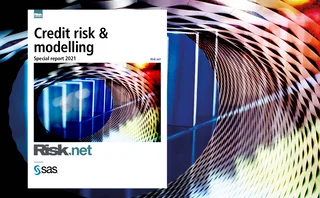
Credit concerns

One area worth a close watch in 2007 is undoubtedly the credit derivatives market. Over the past year, regulators have repeatedly sounded warnings about unsecured credit risk building up in the global financial system. The UK's Financial Services Authority has started investigating how large investment banks manage their collateral, fearing that they may not be ready for a sudden market downturn. It will be asking the banks about the quality of their systems for assessing collateral by checking they have sound collateral agreements, that collateral is correctly valued and appropriate haircuts are imposed and that the correlation between collateral and the value of the underlying exposure to the counterparty is reviewed, in both normal and stressed environments. The watchdog will also look at whether collateral can be realised - and recovered - quickly, if the underlying obligation to the counterparty is extinguished. The FSA is expected to report back in the first half of 2007.
Hence, we felt it was timely to include a credit special report in this issue, in which we discuss the issue of systemic risk, analyse the problem of data insufficiency for credit risk modelling and look at a new product launched by a few dealers - the muni bond - which has taken Asia by storm.
We also cast an eye over Japan, where authorities are set to tighten regulation of derivatives and collective investment schemes by requiring alternative investment marketers, such as hedge funds, to register with the Financial Supervisory Agency. While these firms are supposed to register as securities distributors already, there are many unlicensed alternative marketers and hedge funds soliciting investment in Tokyo. But will anything really change? Some feel the regulator will find it no easier now than it has before to enforce such rules.
Meanwhile, Japan has set the Basel II implementation date at the end of March 2007, and with the deadline just around the corner, many Japanese banks are struggling to meet pillar 2 requirements, as we discover.
And last but certainly not least, we present the results of the annual Asia Risk interdealer survey. It should come as no surprise that Deutsche Bank once again tops the poll, but the success of Standard Chartered Bank and Societe Generale in this year's poll has surprised some dealers.
We would also like to thank all our readers for your support this year. Merry Christmas and a happy new year!
Only users who have a paid subscription or are part of a corporate subscription are able to print or copy content.
To access these options, along with all other subscription benefits, please contact info@risk.net or view our subscription options here: http://subscriptions.risk.net/subscribe
You are currently unable to print this content. Please contact info@risk.net to find out more.
You are currently unable to copy this content. Please contact info@risk.net to find out more.
Copyright Infopro Digital Limited. All rights reserved.
As outlined in our terms and conditions, https://www.infopro-digital.com/terms-and-conditions/subscriptions/ (point 2.4), printing is limited to a single copy.
If you would like to purchase additional rights please email info@risk.net
Copyright Infopro Digital Limited. All rights reserved.
You may share this content using our article tools. As outlined in our terms and conditions, https://www.infopro-digital.com/terms-and-conditions/subscriptions/ (clause 2.4), an Authorised User may only make one copy of the materials for their own personal use. You must also comply with the restrictions in clause 2.5.
If you would like to purchase additional rights please email info@risk.net
More on Credit risk
US bank CROs see only ‘modest’ credit risk from tariffs
Risk Live North America: Lower margins are early sign of stress, but Ally, Citizens and Pinnacle confident on loan books
Credit risk management solutions 2024: market update and vendor landscape
A Chartis report outlining the view of the market and vendor landscape for credit risk management solutions in the trading and banking books
Finding the investment management ‘one analytics view’
This paper outlines the benefits accruing to buy-side practitioners on the back of generating a single analytics view of their risk and performance metrics across funds, regions and asset classes
Revolutionising liquidity management: harnessing operational intelligence for real‑time insights and risk mitigation
Pierre Gaudin, head of business development at ActiveViam, explains the importance of fast, in-memory data analysis functions in allowing firms to consistently provide senior decision-makers with actionable insights
Sec-lending haircuts and indemnification pricing
A pricing method for borrowed securities that includes haircut and indemnification is introduced
XVAs and counterparty credit risk for energy markets: addressing the challenges and unravelling complexity
In this webinar, a panel of quantitative researchers and risk practitioners from banks, energy firms and a software vendor discuss practical challenges in the modelling and risk management of XVAs and CCR in the energy markets, and how to overcome them.
Credit risk & modelling – Special report 2021
This Risk special report provides an insight on the challenges facing banks in measuring and mitigating credit risk in the current environment, and the strategies they are deploying to adapt to a more stringent regulatory approach.
The wild world of credit models
The Covid-19 pandemic has induced a kind of schizophrenia in loan-loss models. When the pandemic hit, banks overprovisioned for credit losses on the assumption that the economy would head south. But when government stimulus packages put wads of cash in…







